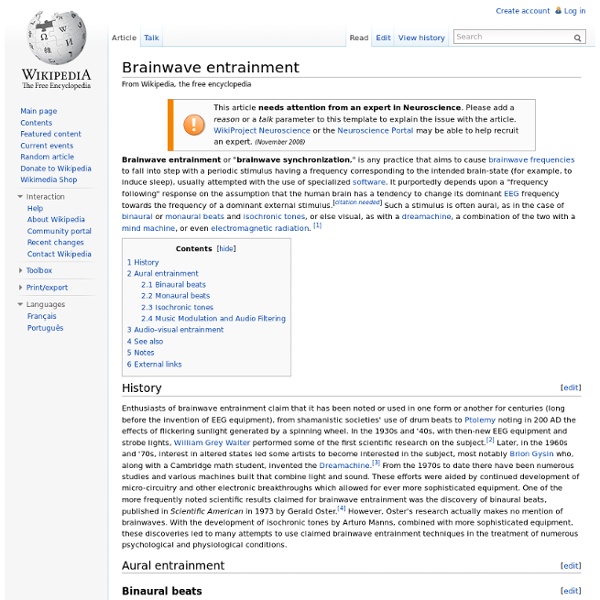Dreyfus model of skill acquisition
In the fields of education and operations research, the Dreyfus model of skill acquisition is a model of how students acquire skills through formal instruction and practicing. Brothers Stuart and Hubert Dreyfus proposed the model in 1980 in an influential, 18-page report on their research at the University of California, Berkeley, Operations Research Center for the United States Air Force Office of Scientific Research.[1] The original model proposes that a student passes through five distinct stages: novice, competence, proficiency, expertise, and mastery. The original five-stage model[edit] Michael Eraut summarized the five stages of increasing skill as follows:[2] Instead the original Dreyfus model is based on four binary qualities:
THE EMERGENT SELF
"Why do emergent selves, virtual identities, pop up all over the place, creating worlds, whether at the mind/body level, the cellular level, or the transorganism level? This phenomenon is something so productive that it doesn't cease creating entirely new realms: life, mind, and societies. Yet these emergent selves are based on processes so shifty, so ungrounded, that we have an apparent paradox between the solidity of what appears to show up and its groundlessness. That, to me, is the key and eternal question." FRANCISCO VARELA The Emergent Self [6.5.01] Francisco Varela died on May 28 at his home in Paris.
dual n back training
Sharpen your Brain with Brain Exercise Software If you agree that the brain is like a muscle and needs exercise, look for brain games. Type “free brain games online” into Google and you’ll find plenty. Brain teasers. N Back Test.
How to become smarter by doing less in the information age
Common: Believing that focusing on detail is the only and best path to success. Uncommon: Let’s be honest: Most things studied in college are quickly forgotten. I believe this is partly due to the sheer number of concepts addressed per class, per semester. In my experience, the emphasis is often on breadth versus depth.
Francisco Varela « Neurophenomenology
(Part I is here, and part III is here) In certain respects, development of the view that embodied experience is crucial to understanding the mind and brain reached a nadir in the period after World War II, at least within psychology. Behaviorism had redefined psychology as an “objective” science with no need to refer to consciousness or phenomenology.
Antioxidants for brain health
Do you want to know how to keep your mind in top condition? There are many ways your brain gets to work less effectively. But just two biochemical flaws underlie most of them. Defective antioxidant protection and reduced mitochondrial energy production. Find out how to avoid these two life curtailing syndromes below.
Hacking Knowledge: 77 Ways to Learn Faster, Deeper, and Better
If someone granted you one wish, what do you imagine you would want out of life that you haven’t gotten yet? For many people, it would be self-improvement and knowledge. Newcounter knowledge is the backbone of society’s progress.
Francisco Varela : Human Consciousness : Articles
‘Neurophenomenology : A Methodological Remedy for the Hard Problem’ Journal of Consciousness Studies, "Special Issues on the Hard Problems", J.Shear (Ed.) June 1996. HTML Version
Increase your brain power now a review of methods and supplements
There are two viewpoints. The brain is a muscle to be exercised or the brain is a chemical factory to be optimized. Sharpen your Brain with brain exercise programs If you agree that the brain is like a muscle and needs exercise, look for brain games. Type “free brain games online” into Google and you’ll find plenty. Do they work?
Mind Mapping, Concept Mapping, Argument Mapping: What are the differences and Do they Matter? (Martin Davies)
Concept mapping, mind mapping and argumentmapping: what are the differences and do they matter? Martin Davies Springer Science+Business Media B.V. 2010 Abstract In recent years, academics and educators have begun to use software map-ping tools for a number of education-related purposes.
Antoine Lutz's Homepage
I am currently an associate scientist at the Waisman Lab for Brain Imaging & Behavior at the University of Wisconsin-Madison. I am doing my research in collaboration with Prof. R. J. Davidson and several researchers from his lab.



